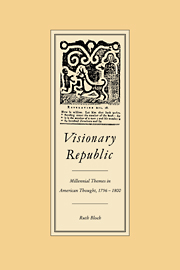Crossref Citations
This Book has been
cited by the following publications. This list is generated based on data provided by Crossref.
Balmer, Randall
1988.
Apocalypticism in America: The Argot of Premillennialism in Popular Culture.
Prospects,
Vol. 13,
Issue. ,
p.
417.
Balmer, Randall
1988.
Apocalypticism in America: The Argot of Premillennialism in Popular Culture.
Prospects,
Vol. 13,
Issue. ,
p.
417.
Popkin, Richard H.
1990.
Essays on the Context, Nature, and Influence of Isaac Newton’s Theology.
p.
165.
Popkin, Richard H.
1990.
Essays on the Context, Nature, and Influence of Isaac Newton’s Theology.
p.
27.
Woodcock, Bruce
1992.
Writing the revolution: Aspects of Thomas Paine's prose.
Prose Studies,
Vol. 15,
Issue. 2,
p.
171.
Greaves, Richard L.
1992.
Radicals, Rights, and Revolution: British Nonconformity and Roots of the American Experience.
Church History,
Vol. 61,
Issue. 2,
p.
151.
Porter, Andrew
1992.
Religion and empire: British expansion in the long nineteenth century, 1780–1914.
The Journal of Imperial and Commonwealth History,
Vol. 20,
Issue. 3,
p.
370.
Ben-Atar, Doron S.
1993.
The Origins of Jeffersonian Commercial Policy and Diplomacy.
p.
87.
Papenfuse, Eric Robert
1994.
From redcompense to revolution: Mahoney v. Ashton and the transfiguration of Maryland culture, 1791–1802.
Slavery & Abolition,
Vol. 15,
Issue. 3,
p.
38.
Adamson, Christopher
1994.
God's Continent Divided: Politics and Religion in Upper Canada and the Northern and Western United States, 1775 to 1841.
Comparative Studies in Society and History,
Vol. 36,
Issue. 3,
p.
417.
Smith, Philip
1994.
The Semiotic Foundations of Media Narratives: Saddam and Nasser in the American Mass Media.
Journal of Narrative and Life History,
Vol. 4,
Issue. 1-2,
p.
89.
Bercovitch, Sacvan
1994.
The Cambridge History of American Literature.
Goff, Philip
1998.
Revivals and Revolution: Historiographic Turns since Alan Heimert'sReligion and the American Mind.
Church History,
Vol. 67,
Issue. 4,
p.
695.
Kelsall, Malcolm
1999.
Jefferson and the Iconography of Romanticism.
p.
1.
Leask, Nigel
2000.
Irish Republicans and Gothic Eleutherarchs: Pacific Utopias in the Writings of Theobald Wolfe Tone and Charles Brockden Brown.
Huntington Library Quarterly,
Vol. 63,
Issue. 3,
p.
347.
Sensbach, Jon
2000.
The Cambridge History of Religions in America.
p.
529.
Carwardine, Richard
2000.
Methodists, Politics, and the Coming of the American Civil War.
Church History,
Vol. 69,
Issue. 3,
p.
578.
Lambert, Frank
2000.
The Cambridge History of Religions in America.
p.
570.
Andrews, Stuart
2000.
The British Periodical Press and the French Revolution, 1789–99.
p.
179.
Hotson, Howard
2000.
Paradise Postponed.
p.
1.



